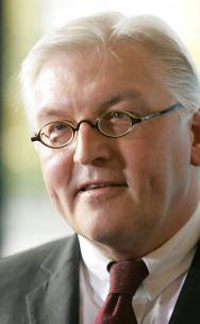Germany considering whether to extend troop presence in Afghanistan

Troops’ pullout now would endanger progress made since the overthrow of the Taliban in 2001, said German government officials, urging parliament to keep Germany's 3,000 troops and five reconnaissance jets in Afghanistan for another year.
Recent opinion polls show most Germans want the troops to come home, but Foreign Minister Frank-Walter Steinmeier argued that would be a mistake. "Anyone who demands withdrawal of the troops from Afghanistan puts at risk everything that we have built up in the last six years," Steinmeier said, while conceding that "the way has been harder than many of us had hoped."
Public support for the mission has dwindled amid attacks on German forces and the kidnappings of Germans there. The debate took on still more urgency after a militant group said it had planned bombings against U.S. and other targets here in an attempt to force Germany out of its air base at Termez, Uzbekistan. The base supports the Afghanistan deployment.
The three suspects, all alleged members of the Islamic Jihad Union - defined by the U.S. State Department as a terrorist organization with links to al-Qaida - were arrested Sept. 4 at a rented cottage in central Germany on suspicion of planning bombings.
Defense Minister Franz-Josef Jung said civil reconstruction work and the military presence were mutually supporting, adding it was in Germany's interest that Afghanistan did not again become "a training center for terrorism," as under the Taliban.
Merkel's government of conservative Christian Democrats and center-left Social Democrats enjoys a broad majority of 446 seats in the 613-seat Bundestag, or lower house. Parties that openly oppose extending the mandate - the environmentalist Greens and the Left Party, made up of former East German communists and disgruntled Social Democrats, hold only 104 votes between them.
The passage of the renewal has been complicated because the government decided to bundle the two mandates - for the ground troops and the reconnaissance jets - together.
The ground troops under the International Security Assistance Force have broad support, but some deputies are uneasy about the Tornado reconnaissance jets as overly emphasizing the military over the reconstruction aspect of the mission. Sixty-nine Social Democrats voted against sending the jets in the first place, but this time could not do so without also opposing the ground troops.
The Greens, at a party conference last weekend, balked at the merger of the two mandates and resolved to vote no or abstain, although some members may break ranks and support the mission.
Merkel, mindful of potential opposition, has resisted any notion that German troops would operate beyond their area in the relatively quiet north of the country.
A vote is expected in early October. A third, more controversial mandate on participation in Operation Enduring Freedom, involving the hunt for terrorists in the region, has been put off until later this fall. German involvement has mostly meant naval patrols checking sea traffic off the Horn of Africa, but opponents object to what they say are too many casualties among the civilian population as part of fighting against resurgent Taliban or terrorist targets.
Greens co-leader in the Bundestag, Juergen Trittin, said on NDR public radio that support for ISAF did not extend to the jets or the war on terror under Enduring Freedom: "We want development in Afghanistan and we want development to be secured militarily."
"At the same time, we think that the military action by the Americans under OEF, like the Tornado planes, is not only not useful or existentially necessary for development, but in many respects are actually harmful."
Subscribe to Pravda.Ru Telegram channel, Facebook, RSS!


